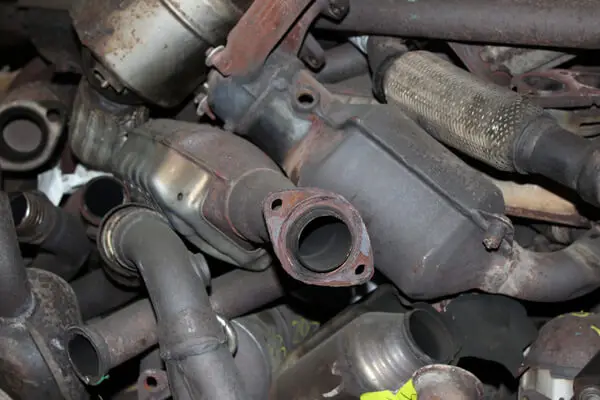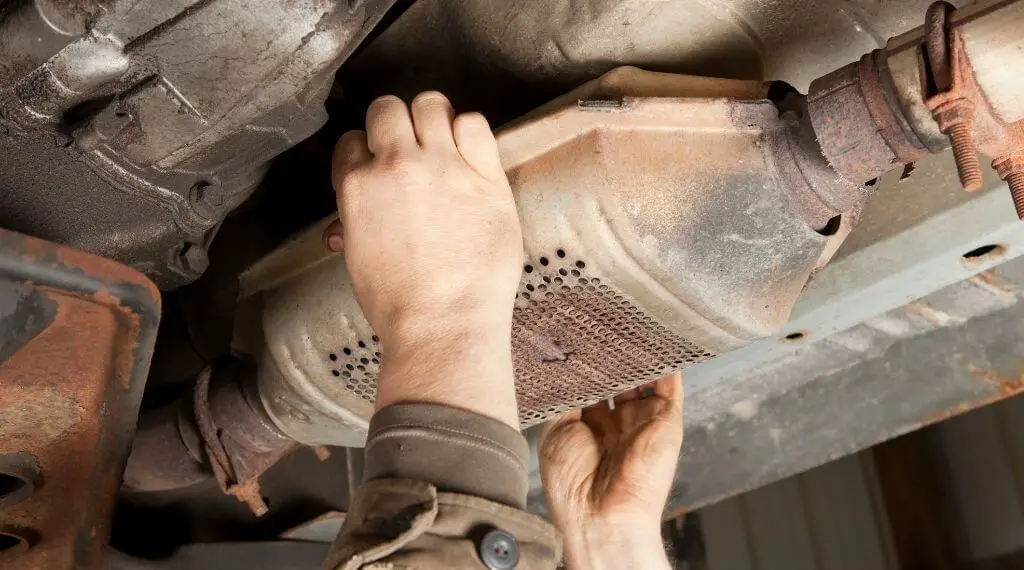Chances are if you are reading this article your catalytic converter has been stolen, or you are interested in preventing a catalytic converter from being stolen.
Catalytic converters are part of a vehicle’s exhaust system that helps reduce toxic emissions. They are frequently stolen because they contain precious metals like platinum, rhodium, palladium.
Catalytic converter theft is rising at an alarming rate
According to the National Insurance Crime Bureau, there has been more than a tenfold increase in catalytic converter thefts in the last three years alone. Last year, State Farm saw a 293% growth of catalytic converter theft claims compared to a year prior.
And, it’s not just a problem in the United States. Zurich Insurance, based in the UK, reported a 5-fold increase in catalytic converter theft, with Honda, Toyota, and Lexus hybrids making up for 78% of all catalytic converter thefts. The Toyota Prius topped the list. If you own a Prius, take these steps to protect it.
Why is catalytic converter theft on the rise?
The rate of catalytic converter theft has picked up in recent years. Significantly.
Experts agree that restrictive emissions legislation, Covid-19 shutdowns, high resale value at scrap yards, and the ease at which catalytic converters are stolen are the primary reasons why catalytic converter theft is on the rise.
Increase in restrictive emissions legislation
Some states like California have very restrictive laws on what type of catalytic converter can be installed on vehicles. This makes them highly desirable in these states.
For example, The California Air Resources Board (CARB) has identified several catalytic converter models as zero emissions, CARB-compliant catalytic converters. Only these models can legally be installed on vehicles in California.
And at the time of this article, nine other states have adopted the CARB zero-emissions standard. They include Connecticut, Maine, Maryland, Massachusetts, New Jersey, New York, Oregon, Rhode Island, and Vermont.
A CARB-compliant catalytic converter replacement can cost upwards of $3000.00, while the average catalytic converter repair using aftermarket or OEM, non-CARB-compliant catalytic converters can be as little as $500 to 1500.00 USD.
Covid-19 shutdowns and supply chain disruption
Another reason for catalytic converter theft is also due to the precious metals inside them.
Platinum, rhodium, and palladium are valuable metals found in catalytic converters. These materials are in high demand as they are also used in other items like electronics, jewelry, fuel cells, plus a wide range of commercial uses.
Before Covid, theft was up due to the value of these precious metals, but Covid has amplified the price increase of these metals.
Most mines in Russia, South Africa, North and South America shut down or partially shut down during the Covid-19 pandemic as did many manufacturing plants. This created a high demand for these raw materials plus the converters themselves. As a result, demand and prices shot up dramatically.
Why platinum, rhodium, and palladium?
These metals are needed to remove the nitrogen oxides and carbon monoxide from car exhaust and convert them to water vapor and carbon dioxide, which is less harmful to the atmosphere and air quality.
High resale value

A stolen catalytic converter can be resold for $50-150.00 depending on the amount of metals inside them. Most are resold through private party resale, as well as direct to junkyards, scrap yards, and waste recycling plants that buy scrap metal.
While many reputable companies do not participate in buying back converters without proof that the owner owned the catalytic converter being recycled, many don’t bother to check. And herein lies the problem.
More legislation and better record-keeping are needed to make it hard to resale a catalytic converter. Especially if you can’t prove it came off a vehicle you own.
It is easy to steal catalytic converters
Another reason for catalytic converter theft is that stealing catalytic converters is easy. Thieves look for cars on quiet streets and neighborhoods or cars parked in poor-lit areas, but many thieves steal converters from mall parking lots or in big open lots in plain daylight. Especially where there is a large concentration of cars.
It takes just 1-2 minutes to remove a catalytic converter by simply cutting the exhaust pipe in front and back of it using a battery-operated saw. It takes two quick cuts and off they go especially if they can access underneath your car.
You will know instantly the minute you start your engine if it is missing. Your car will sound very loud, especially as you push down on the gas pedal.
What is being done about the increase of catalytic converter theft?
Due to the high number of thefts, many states, like Ohio, Oregon, and Texas have passed legislation to make catalytic converter theft a felony or restrict the resale of catalytic converters. Some states have laws that require the identification of the seller. The goal is to deter only allow theft by only allowing the owner of the vehicle the ability to sell it.
While this makes it harder for thieves to profit from the theft, it has to be enforced.
Police and Prevention Programs

Many police departments track theft reports and increase patrols in areas with high incidents of catalytic converter theft. Most officers are aware of what cars are at high risk, but the theft can occur in under two minutes, and unfortunately catching thieves in the act is a manner of finding a needle in a haystack.
Another problem is that many thefts go unreported. In some cases, the car may not be covered under insurance other than general liability so many vehicle owners don’t bother with reporting it because the police report is not going to be used for insurance claims.
The best way to prevent catalytic converter theft is to park in well-lit areas, or in your garage if you have one. Avoid parking on open streets if you can to make it harder for thieves to spot your car or get access to its exhaust system underneath. Thieves will often pass up easy targets and move on.
If you can, consider installing a catalytic converter guard or cage, which you can usually get installed by your neighborhood mechanic. These devices surround your catalytic converter with hardened steel cables or a metal cover to make it harder for thieves to get access to them or cut them.
Thieves will see the cover and often move on to an easier target. It won’t guarantee that your catalytic converter won’t get stolen, but it drastically decreases your chances.

